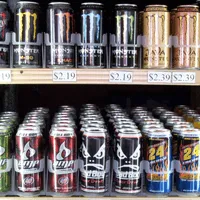
- Share on Facebook1
- Share on Pinterest
- Share on Twitter
If you have recently visited a local youth baseball diamond, basketball court, or soccer field, you have undoubtedly seen children and adolescents consuming energy drinks prior to and during athletic events.
 Unlike soft drinks, the FDA does not regulate the amounts or ingredients listed in energy drinks which are classified as dietary supplements. This means the actual caffeine concentrations can be significantly higher than what is listed on the labels. Excessive caffeine ingestion (which can be as little as 1 energy drink plus 1 soda throughout a day) can lead to symptoms of anxiety and jitteriness along with withdrawal symptoms of headache and fatigue.
Unlike soft drinks, the FDA does not regulate the amounts or ingredients listed in energy drinks which are classified as dietary supplements. This means the actual caffeine concentrations can be significantly higher than what is listed on the labels. Excessive caffeine ingestion (which can be as little as 1 energy drink plus 1 soda throughout a day) can lead to symptoms of anxiety and jitteriness along with withdrawal symptoms of headache and fatigue.
At higher quantities energy drink consumption can lead to abdominal pain, vomiting, electrolyte abnormalities, stroke, seizures, paralysis, cardiac arrhythmias, and even death. Additionally, the ingredients in these drinks can dangerously interact with other medications that a child may be taking.
With no safe level of consumption established and research showing no therapeutic benefit as well numerous case reports of serious health risks for children who consume these beverages, it is imperative that parents and pediatricians talk with children about their use of energy drinks.
For specific questions regarding energy drinks and the potential effects on the pediatric population, please consult with your physician.
– Dr. Chad Rudnick
Dr. Chad Rudnick is a Pediatric Resident at Miami Children’s Hospital, Miami, FL.
A published author, clinical research investigator, public speaker, and debate moderator, Chad is also an active member of the American Medical Association, Florida Medical Association, and has served on the executive council of the Hillsborough County Medical Association. Visit Dr. Rudnick’s website here at DrChadRudnick.com
- Share on Facebook1
- Share on Pinterest
- Share on Twitter

